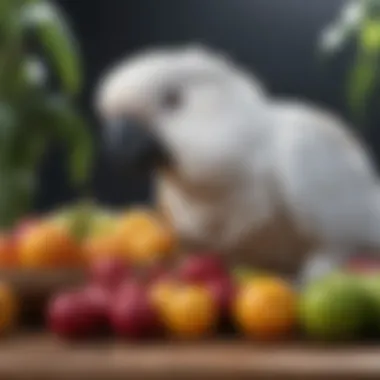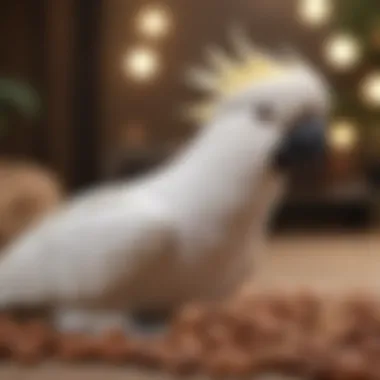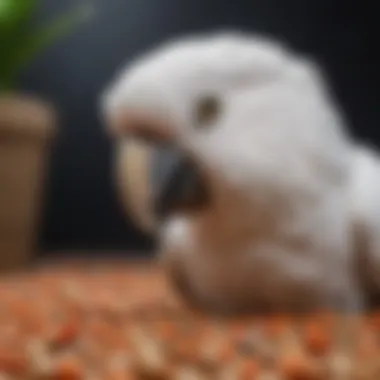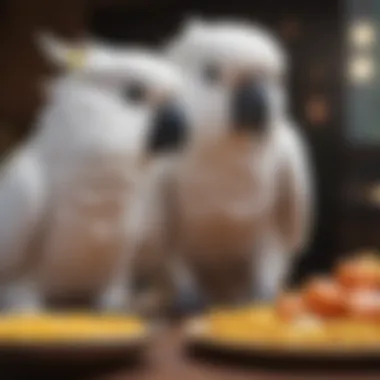Understanding Cockatoo Diet: Essential Nutritional Guide


Intro
The nutritional needs of cockatoos are intricate and multifaceted, making it essential for caregivers to fully grasp their dietary requirements. As intelligent and social birds, cockatoos demand a diet that is not only nutritionally balanced but also tailored to their species-specific penchants. This section will delve into the significance of understanding cockatoo diets, emphasizing the importance of a diverse and healthy menu to support their well-being.
Understanding Your Pet
Understanding the needs of a cockatoo goes beyond feeding the right food. It requires insight into their behavior as well as their specific dietary requirements. Knowledge in this area enhances the bond between the bird and its owner while promoting overall harmony.
Pet Behavior Basics
Cockatoos are known for their strong personalities and social behaviors. Their sociability necessitates interaction, both with humans and other birds. Understanding these behaviors can highlight how their diet plays a crucial role in their mood and activity levels. An irritable cockatoo may be a sign of an unbalanced diet or insufficient engagement, which can make it imperative for owners to pay close attention to feeding practices.
Common Breed Characteristics
Different cockatoo species exhibit varying characteristics, including size, color, and temperament. Larger breeds, like the Umbrella Cockatoo, may have different nutritional needs than smaller breeds, such as the Goffin’s Cockatoo. Owners must be aware of these differences, as they can impact dietary preferences and needs.
Species-Specific Needs
Each species of cockatoo has its own unique requirements. For instance, some may thrive with a diet rich in seeds, while others may need a significant portion of fresh fruits and vegetables to maintain their health. Understanding what your specific cockatoo needs can greatly influence its happiness and longevity. It’s crucial to research the specific species you are caring for and adapt feeding strategies accordingly.
Pet Care and Maintenance
Proper maintenance of your cockatoo extends well beyond diet. Aside from food, maintaining hygiene and grooming standards are pivotal for a healthy life.
Feeding Guidelines
When it comes to feeding cockatoos, providing a variety of food types is crucial. Their diets should include:
- High-quality pellets
- Fresh fruits
- Fresh vegetables
- Nuts (in moderation)
The balanced intake of these types of food ensures that cockatoos receive the necessary vitamins and minerals to thrive.
Grooming Essentials
Grooming is another key aspect of pet care. Regular feather care and nail trimming are essential for maintaining health. Inadequate grooming can lead to problems such as feather plucking or overgrown nails, both of which can create further health issues.
Hygiene Practices
Just as important as grooming is ensuring a clean environment for your cockatoo. Cleaning cages, food dishes, and perches helps prevent bacteria and disease, supporting a healthier lifestyle for your bird.
Health and Wellness
Maintaining the health of your cockatoo requires vigilance and proactive care.
Routine Vet Check-ups
Frequent veterinary check-ups are recommended to catch any potential health issues early. Avian veterinarians are best equipped for such checks, so finding one in your area is a smart move.
Vaccination Needs
Cockatoos are susceptible to various diseases, so vaccinations are an important part of healthcare. Discuss with your vet about the appropriate vaccination schedule for your specific bird.
Recognizing Signs of Illness
Understanding the subtle signs of illness in cockatoos can make a critical difference. Look for any changes in behavior, such as:
- Decreased activity
- Changes in appetite
- Altered vocalization
These signs can indicate that your bird may need veterinary attention.
Enrichment and Activities
Physical and mental stimulation is vital for pets like cockatoos, who thrive on interaction and engagement.


Indoor vs.
Outdoor Activities
Cockatoos enjoy a mix of both indoor and outdoor activities. Indoor play can involve climbing structures, while outdoor time should be supervised to ensure safety from predators.
Interactive Toys and Games
Investing in toys that encourage problem-solving can help keep a cockatoo engaged. Toys that require manipulation or encourage foraging can enhance their cognitive skills and satisfaction.
Socialization Opportunities
Since cockatoos are social birds, regular social interaction is important. Activities that allow them to interact with family members or other birds can improve their overall happiness and reduce feelings of loneliness or boredom.
Preamble to Cockatoo Nutrition
Understanding the nutritional needs of cockatoos is vital for several reasons. The diet of these birds directly affects their health, longevity, and overall well-being. A well-balanced diet tailored to a cockatoo's specific requirements fosters not only physical health but also enhances behavior and cognitive function. This section will delve into the unique aspects of cockatoo nutrition to illuminate its significance and practical implications for pet owners.
Understanding Cockatoo Species
The first step in addressing cockatoo nutrition is recognizing the diversity among the various species. Cockatoos belong to the family Cacatuidae, which includes numerous types, each with its own dietary preferences and requirements. For instance, the Umbrella Cockatoo thrives on a different set of foods compared to the Moluccan Cockatoo. Some species may naturally consume more seeds, while others may depend more on fruits, vegetables, and nuts. Recognizing these differences is crucial for providing the appropriate diet that meets their specific needs.
Proficiency in identifying the right diet for each species promotes better health outcomes. Pet owners need to research the characteristics and natural diets of their cockatoo species. This understanding shapes a well-rounded feeding plan that incorporates a variety of food types, ensuring that all nutritional needs are met.
Importance of a Balanced Diet
A balanced diet for cockatoos encompasses a mix of essential components needed for their growth and vitality. Just like humans, cockatoos need a variety of nutrients for energy, immune system support, and overall maintenance. Key elements include proteins, vitamins, and fats, among others. Without a proper balance, cockatoos may face health risks, such as obesity, feather plucking, or malnutrition.
Caregivers should aim for a diet that reflects the diverse nature of the cockatoo's natural environment. Incorporating a range of foods ensures that the birds receive all necessary nutrients while keeping their diets interesting. Monitoring their condition and adapting the diet is also a crucial consideration. For instance, if a cockatoo shows signs of lethargy or feather issues, a reevaluation of its diet may be necessary.
A well-planned diet is the cornerstone of ensuring that cockatoos thrive in captivity, equipping them to lead healthier and longer lives.
Essential Nutritional Components
The cockatoo's diet is more than just a collection of food items; it is a critical aspect of their overall health. Understanding the essential nutritional components is vital. These nutrients contribute to their physical well-being, immune system, and even their behavior. A balanced intake of macronutrients and micronutrients ensures that these intelligent birds thrive.
Macronutrients in Cockatoo Diet
Proteins
Proteins are essential for growth and repair in cockatoos. These nutrients help in building muscle, supporting feathers, and maintaining skin health. The primary characteristic of proteins is that they are made up of amino acids. It is crucial for cockatoos to have a variety of amino acids in their diet. For this article, protein-rich foods like cooked legumes, lean meats, or high-quality pellets are good choices. However, excess protein can lead to health issues.
Fats
Fats play a significant role in providing energy. They are important for absorbing fat-soluble vitamins as well. The key characteristic of fats is that they provide concentrated energy. Healthy fats from avocados or certain nuts can be beneficial. However, excessive intake can lead to obesity in cockatoos. Balancing the level of fats is essential.
Carbohydrates
Carbohydrates are a primary energy source. They support daily activities and metabolic functions. The major characteristic of carbohydrates is their role as a quick energy provider. Whole grains like quinoa or brown rice are good sources. Yet, too many carbohydrates can cause weight issues, so moderation is key.
Micronutrients Importance
Vitamins
Vitamins are vital for healthy metabolism and overall health. Each vitamin has a specific role. For instance, Vitamin A is crucial for vision and immune function, while Vitamin D helps in calcium absorption. A varied diet including leafy greens and colorful fruits is reliable for providing these vitamins. However, supplements should only be given when necessary to avoid toxicity.
Minerals
Minerals, like calcium and phosphorus, are crucial for bone health and other bodily functions. They aid in muscle contraction and nerve transmission. The key feature of minerals is their necessity in trace amounts. Fresh produce and specific pellets are good mineral sources. However, the imbalance could lead to deficiency or toxicity in cockatoos.
Water's Role in Diet
Water is often overlooked but is critical in the cockatoo diet. It aids digestion, helps in thermoregulation, and keeps organs functioning well. A cockatoo requires access to clean and fresh water constantly. Dehydration can lead to a range of health issues, such as kidney problems. Therefore, providing a source of water that is free of contaminants is fundamental.


Water intake is as significant as all other nutrients combined for the well-being of cockatoos.
In summary, understanding these essential nutritional components allows cockatoo owners to provide a diet that supports their birds' health and happiness.
Types of Foods for Cockatoos
Understanding the appropriate types of food for cockatoos is essential to their health and well-being. These birds have specific dietary needs that must be met through various food sources. A diverse diet helps to ensure that cockatoos receive adequate nutrients while also providing enrichment and preventing boredom. Below, we explore key food categories that contribute to a balanced cockatoo diet.
Seeds and Grains
Seeds and grains form a fundamental part of the cockatoo diet. They are high in calories, making them a crucial energy source. However, not all seeds are created equal. For example, sunflower seeds are often favored by birds due to their high fat content. While fat is important in moderation, an overreliance on seeds like sunflower can lead to obesity or nutritional imbalances.
When choosing seeds, look for varied blends that include millet, canary seeds, and oats. These offer a more balanced nutrient profile. Keep in mind that seeds should only comprise a portion of their overall diet. Too much can create dependency and might encourage selective eating, where birds refuse other essential foods.
Fresh Fruits and Vegetables
Fresh fruits and vegetables are vital for cockatoos. They provide essential vitamins, minerals, and hydration. Different fruits and vegetables offer various health benefits. For example, leafy greens like kale and spinach are rich in calcium and vitamin A. Fruits such as apples and berries contribute necessary antioxidants.
Ensure variety in the types of fruits and vegetables provided. Some cockatoos may show preferences for certain items, which is natural. Rotate these foods regularly to keep up interest and provide a broader nutrient intake. Always remember to wash fruits and vegetables thoroughly to remove any pesticides or contaminants.
Pelleted Diets
Pelleted diets are formulated to offer complete nutrition. These specially designed pellets contain balanced levels of vitamins, minerals, and other nutrients to meet cockatoos’ dietary requirements. They can reduce the risk of any nutritional deficiencies that can arise from a seed-only diet.
Many pet owners find pellets convenient as they prevent selective eating. However, it’s still important to introduce pellets gradually. Sudden changes can cause refusal and distress. Monitor the bird's acceptance and adjust accordingly, allowing them to explore this option without forcing.
Nuts and their Benefits
Nuts are an excellent source of healthy fats and protein for cockatoos. They cater to natural foraging behaviors. However, nuts should be given in moderation due to their high-fat content. Safe options include almonds, walnuts, and pistachios. These nuts are not just beneficial; they also provide a tactile and mental challenge for birds as they work to access the nut inside.
Some cockatoos may thrive on the varied textures and flavors of different nuts. Always consider the size and cut of nuts to ensure they are easily manageable for your bird, preventing choking hazards.
A well-rounded diet consisting of seeds, fresh produce, pellets, and nuts plays a crucial role in maintaining the overall health and vibrancy of cockatoos. By understanding the importance of different food types, caregivers can foster a nutrient-rich environment, enhancing the quality of life for these intelligent birds.
Feeding Techniques and Practices
Feeding Techniques and Practices are crucial to ensuring the health and happiness of cockatoos. Proper techniques can help optimize their well-being and prevent various health issues. Understanding how to feed these birds can make a significant difference in their behavior and quality of life. Focusing on frequency, portion sizes, food rotation, and avoiding toxic foods will provide a comprehensive approach for caregivers.
Frequency and Portion Sizes
The frequency of feeding and the size of portions are essential. Cockatoos thrive on establishing a regular schedule, which offers them predictability. Typically, they should be fed twice a day, with a defined morning and evening routine. This consistency helps them feel secure and comfortable.
Portion sizes should align with the individual bird's weight and activity level. A general guideline is to offer about 15 to 20% of the bird's body weight in food daily. It's important to observe if the cockatoo is finishing its meals or leaving food uneaten. If they are constantly leaving food behind, portions might be too large. Conversely, if they seem hungry frequently, it may be time to increase the amount offered. Monitoring their weight can also guide portion adjustments.
Food Rotation and Variety
Food rotation and variety are key elements in maintaining a balanced diet. Cockatoos, being intelligent and curious creatures, benefit from experiencing new foods regularly. This not only provides nutritional diversity but also stimulates their mental engagement. Changing the menu every few days can help prevent boredom and encourage greater exploration of their diet.
It's advisable to introduce new fruits, vegetables, and even nut types gradually. This allows the bird to adjust to different tastes and textures. A diverse diet can also ensure they receive a wide range of essential nutrients. Additionally, rotating foods can prevent the risk of developing preferences for unhealthy options, promoting more balanced eating habits.
Avoiding Toxic Foods
Avoiding toxic foods is one of the most critical aspects of feeding cockatoos. Certain foods that humans consume can cause serious harm to birds. Common toxic items include avocado, chocolate, caffeine, and foods high in salt and sugar. It is imperative for caregivers to be aware of these dangers.
Educating oneself on safe food choices is essential for all cockatoo owners. Familiarizing with both toxic and safe options helps avoid accidental ingestion. Reading labels on commercial bird food is important to ensure there are no harmful additives. Creating a list of safe foods can also be beneficial when preparing meals.
Remember, health issues from poor dietary choices can be serious. Always prioritize safety in feeding practices.
In summary, Feeding Techniques and Practices provide a structured way to meet the nutritional needs of cockatoos. Establishing regular meal times, appropriate portion sizes, encouraging food variety, and knowing which foods to avoid are foundational elements to keep these birds healthy and happy.
Special Dietary Needs
Understanding the special dietary needs of cockatoos is crucial for their health and longevity. Different life stages and health status require specific nutritional considerations. This section focuses on important factors that influence the diet of cockatoos, particularly for young birds, aging cockatoos, and those needing weight management.


Dietary Considerations for Young Cockatoos
Cockatoos in their early stages of life need a diet rich in proteins and essential fatty acids. Young cockatoos are growing rapidly, making their nutritional goals quite different from adults. Proper nutrition is vital for muscle development, bone growth, and feather formation. Include a variety of foods such as nutrient-dense pellets, soft grains, and higher protein options like cooked eggs or legumes.
Feeding young cockatoos should also consider their developing immune system. Incorporating fresh fruits and vegetables can provide important vitamins and antioxidants. Examples include kale, carrots, and apples. Engage in frequent small meal servings to mimic a natural feeding behavior, which promotes a sense of security and encourages foraging skills.
Nutritional Adjustments for Aging Birds
As cockatoos age, their metabolism and activity levels change. Nutritional adjustments are necessary to address potential health issues such as obesity or metabolic disorders. Elderly cockatoos may benefit from a diet lower in fats and higher in fiber. Fiber aids digestion, which is critical since older birds may experience gastrointestinal issues.
Pelleted diets specially formulated for senior birds can offer the necessary nutrients while minimizing excess calories. It's essential to consult a veterinarian for tailored recommendations that suit specific health needs. For aging cockatoos, hydration is also critical. Fresh water should be available at all times to facilitate bodily functions, especially if the bird is less active.
Weight Management Strategies
Maintaining a healthy weight for cockatoos is a delicate balance. Obesity in birds can lead to several health issues, including heart disease and joint problems. To manage weight effectively, owners should monitor both the quality and quantity of food provided.
An appropriate feeding schedule plays a major role in weight management. Portion control is necessary—measure daily servings based on the specific needs of the bird. Providing fresh, varied foods will help to keep their interest piqued and ensure they receive diverse nutrients. The following strategies can be useful:
- Avoid high-fat treats and limit seed-based diets, as they can be calorie-dense.
- Encourage foraging behaviors by hiding food around the cage.
- Increase interactive playtime, which naturally promotes greater activity levels.
Maintaining a careful balance of caloric intake and expenditure is essential for the overall health of cockatoos.
By recognizing and catering to the special dietary needs of cockatoos throughout their lives, owners can significantly enhance the quality of life for their feathered companions.
Behavior and Diet Interconnection
Understanding the relationship between behavior and diet is essential for cockatoo caregivers. These intelligent birds exhibit a wide range of behaviors that can be influenced significantly by their dietary intake. A well-planned diet can lead to a happier and healthier bird, while poor nutrition can result in behavioral issues. This section will explore how these factors interact and the various aspects to consider.
Impact of Diet on Behavior
Cockatoos are known for their vibrant personalities and complex social structures. Their behavior often reflects their environment, and diet plays a crucial role in this. Nutritional deficiencies can manifest in several ways, including increased aggression, feather plucking, or lethargy. For instance, an inadequate supply of essential fatty acids may lead to irritability while a lack of vitamins can cause overall malaise.
Moreover, certain foods can encourage playful and sociable behavior. Fresh fruits, for example, not only provide vital nutrients but also stimulate natural foraging instincts. By offering a variety of colors and textures in their diet, pet owners can foster engagement and exploration. Understanding these dietary impacts empowers owners to create a supportive environment for their cockatoos.
Enhancing Mental Stimulation through Food
Feeding practices can serve as powerful tools for mental stimulation. Cockatoos are highly intelligent and require challenges to keep their minds active. Interactive feeding, where treats or other foods are hidden within toys or puzzle feeders, encourages problem-solving and exploration.
Incorporating food that requires manipulation before consumption can also enhance a cockatoo’s day. For example, offering whole nuts encourages the bird to crack them open, providing a satisfying challenge while keeping them engaged. Such activities mimic natural foraging behavior and help prevent boredom, which is crucial for overall well-being.
Here are some methods to promote mental stimulation through diet:
- Puzzle feeders: Use toys that require effort to access food.
- Scattered treats: Hide small pieces of food in different locations, prompting foraging behavior.
- Fresh foraging: Provide safe branches and leaves that can be stripped for food.
A varied diet not only supports physical health but also enhances mental stimulation for cockatoos.
Implementing these practices is a proactive approach to maintaining both behavioral health and overall wellness in cockatoos. Understanding the connections between diet and behavior is fundamental for any responsible bird owner.
Closure and Best Practices
In concluding this comprehensive examination of cockatoo diets, it is vital to recognize the relationship between proper nutrition and the overall health of these magnificent birds. The insights gained from this exploration serve as a guide for both new and experienced pet owners. A deep understanding of a cockatoo's nutritional needs is essential to promote longevity and wellness. This final section synthesizes key points previously discussed, emphasizing the importance of adopting best practices in feeding techniques.
Recap of Nutritional Essentials
Cockatoos thrive on a varied diet that includes essential macronutrients and micronutrients. A well-rounded meal plan should encompass:
- Proteins: Vital for growth and repair of body tissues.
- Fats: Necessary for energy and absorption of vitamins.
- Carbohydrates: Essential for overall energy supply.
- Vitamins and Minerals: Critical for immune function, bone health, and metabolic processes.
Diverse food sources such as seeds, legumes, nuts, fresh fruits, and vegetables should be integrated. This mixture ensures a complete nutrient profile, allowing for holistic health benefits.
Proper nutrition is not just about feeding; it's about understanding the intricate needs of your cockatoo.
Implementing Dietary Guidelines
Implementing effective dietary guidelines is crucial for any cockatoo caregiver. Here are some actionable strategies to follow:
- Monitor Portion Sizes: Overfeeding can lead to obesity. It's essential to adjust portions based on the bird's age, weight, and activity level.
- Rotate Foods: Regularly changing the types of food keeps the diet interesting and ensures varied nutrient intake. Rotate between seeds, fresh produce, and pellets.
- Educate Yourself on Toxic Foods: Become knowledgeable about which foods are harmful to cockatoos. Common toxic items include chocolate, avocado, and certain seeds.
By committing to these practices, caregivers can foster an environment conducive to the health and well-being of their cockatoos, ensuring they flourish both physically and mentally.







